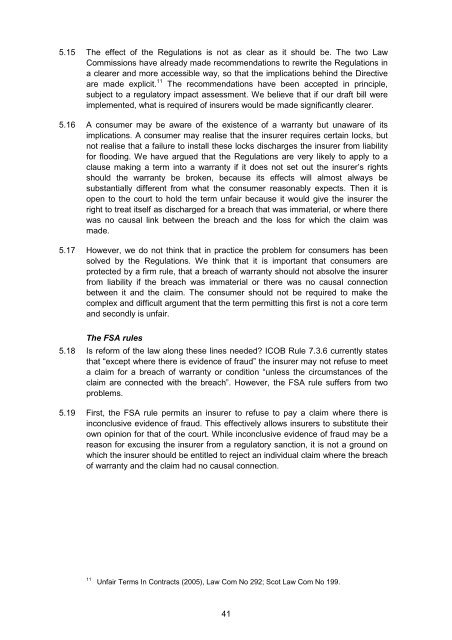Insurance Contract Law Issues Paper 2 Warranties - Law Commission
Insurance Contract Law Issues Paper 2 Warranties - Law Commission
Insurance Contract Law Issues Paper 2 Warranties - Law Commission
Create successful ePaper yourself
Turn your PDF publications into a flip-book with our unique Google optimized e-Paper software.
5.15 The effect of the Regulations is not as clear as it should be. The two <strong>Law</strong><br />
<strong>Commission</strong>s have already made recommendations to rewrite the Regulations in<br />
a clearer and more accessible way, so that the implications behind the Directive<br />
are made explicit. 11 The recommendations have been accepted in principle,<br />
subject to a regulatory impact assessment. We believe that if our draft bill were<br />
implemented, what is required of insurers would be made significantly clearer.<br />
5.16 A consumer may be aware of the existence of a warranty but unaware of its<br />
implications. A consumer may realise that the insurer requires certain locks, but<br />
not realise that a failure to install these locks discharges the insurer from liability<br />
for flooding. We have argued that the Regulations are very likely to apply to a<br />
clause making a term into a warranty if it does not set out the insurer’s rights<br />
should the warranty be broken, because its effects will almost always be<br />
substantially different from what the consumer reasonably expects. Then it is<br />
open to the court to hold the term unfair because it would give the insurer the<br />
right to treat itself as discharged for a breach that was immaterial, or where there<br />
was no causal link between the breach and the loss for which the claim was<br />
made.<br />
5.17 However, we do not think that in practice the problem for consumers has been<br />
solved by the Regulations. We think that it is important that consumers are<br />
protected by a firm rule, that a breach of warranty should not absolve the insurer<br />
from liability if the breach was immaterial or there was no causal connection<br />
between it and the claim. The consumer should not be required to make the<br />
complex and difficult argument that the term permitting this first is not a core term<br />
and secondly is unfair.<br />
The FSA rules<br />
5.18 Is reform of the law along these lines needed? ICOB Rule 7.3.6 currently states<br />
that “except where there is evidence of fraud” the insurer may not refuse to meet<br />
a claim for a breach of warranty or condition “unless the circumstances of the<br />
claim are connected with the breach”. However, the FSA rule suffers from two<br />
problems.<br />
5.19 First, the FSA rule permits an insurer to refuse to pay a claim where there is<br />
inconclusive evidence of fraud. This effectively allows insurers to substitute their<br />
own opinion for that of the court. While inconclusive evidence of fraud may be a<br />
reason for excusing the insurer from a regulatory sanction, it is not a ground on<br />
which the insurer should be entitled to reject an individual claim where the breach<br />
of warranty and the claim had no causal connection.<br />
11 Unfair Terms In <strong>Contract</strong>s (2005), <strong>Law</strong> Com No 292; Scot <strong>Law</strong> Com No 199.<br />
41

















